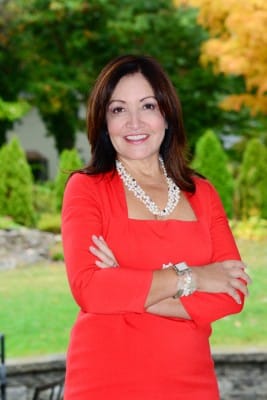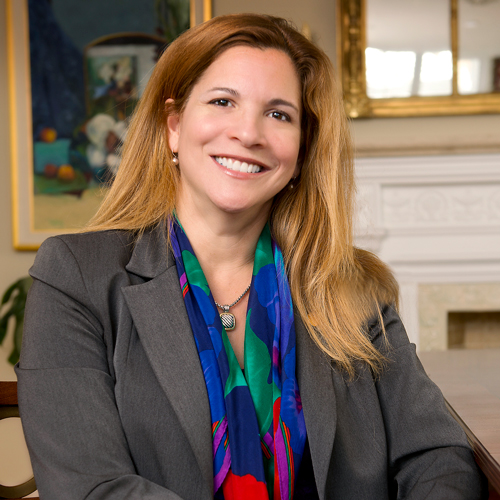In the Brooklyn neighborhood where Aixa Beauchamp grew up, a town house now sells for about $2.2 million. The Brooklyn of Beauchamp’s memories, however, belongs to a different era. In the 1970s, working-class Latino families like hers were struggling just to get by in the same Brooklyn barrio. During that decade, a push for improvements in inner-city education made educational opportunities slightly less rare for Latinos. “Many people were going into education and trying to change the trajectory for kids in inner city communities,” Beauchamp says.

Thanks to those teachers, Beauchamp was pushed academically and motivated to achieve higher education. She became the first in her family to graduate college—Harvard. A world of possibilities was now open to her, and she felt deeply impacted by the power of education.
Upon graduation, Beauchamp chose to contribute her talents to the nonprofit sector and she began building a long career that would take her around the world, keeping Boston as her base. Over the course of her career, she has built and managed community-facing programs for institutions like the NY Community Trust, the Rockefeller Foundation, Hispanics in Philanthropy, and countless others.
For Beauchamp, giving back is an obligation. “As Latinos, most of us have parents that came here to pursue the American dream, but 35 percent of Latino children in the United States live below the poverty line compared to 12 percent of non-minorities,” she says. “The American dream is crumbling for many of our families, but we have the chance to address that through philanthropy.” Throughout her career, Beauchamp has encouraged business executives, politicians, and other leaders to invest in Hispanic communities to help revive that American dream. The solution is to provide the community with access to resources and mentorship.
More determined than ever to drive change, Beauchamp co-founded the Latino Legacy Fund with Juan Carlos Morales in 2012. Together, with nine other committee members and in partnership with the Boston Foundation and Hispanics In Philanthropy (HIP), Beauchamp and Morales are raising $1 million to launch what will become a permanent endowment that will support Latino-led and Latino-serving initiatives in the Greater Boston area.
“We created the fund as a way to encourage other foundations and corporations to make more serious investments in our communities so we can create stronger generations of Latino citizens ready to lead,” Beauchamp says.
The cofounders planned to introduce the Latino Legacy Fund as having a focus on education. “We wanted a specific cause because when a fund is generalized, people don’t really understand what they’re supporting,” says Beauchamp. No issue impacts the Latino community in Boston more than access to quality education. 60 percent of the Latino population cannot read proficiently by third grade. The group also struggles in language and mathematics scores more than their non-Latino peers. Investment in early education, reports have found, tie directly to high school completion rates and college enrollment. While 69 percent of Latinos are now enrolling, only five percent of all minorities complete college.
Beauchamp’s overarching objective is to change the statistics. Nationally, the poverty rate for Hispanics in 2013 was 23.5 percent compared to 9.6 percent for Caucasians. HIP published a report entitled “Foundation Funding in the Latino Community” that revealed only one percent of spending by US foundations goes to Latino organizations, even though the demographic makes up nearly one quarter of all children and youth in the country and 16 percent of the total population.
“As Latinos, most of us have parents that came here to pursue the American dream, but 35 percent of Latino children in the United States live below the poverty line.”
“Despite the fact that we’re more visible and vocal around the state—and we’re the fastest-growing population in the country—there are so many issues hampering our efforts to create the next generation of leaders,” Beauchamp says, adding that the entire state will suffer if communities don’t start taking serious steps to ensure that every Latino student has the skills and knowledge needed to succeed in the workforce.
“When immigrants get involved in philanthropy, their participation in politics and engagement in mainstream civil life increases, too,” Beauchamp says, adding that these steps also help to boost the demographic’s visibility in the area.
In late 2014, the Latino Legacy Fund gave out its first $100,000 award to fund five organizations that focus on early childhood education; half of those organizations are Latino-led and the other half are Latino-serving. This year, Beauchamp and her partners will focus on growing the fund, which will continue to help establish a permanent source of support to improve educational opportunities for Latinos in Boston. As the Latino Legacy Fund grows, it plans to support other issues that impact Latinos such as health care, immigration, and economic development.

